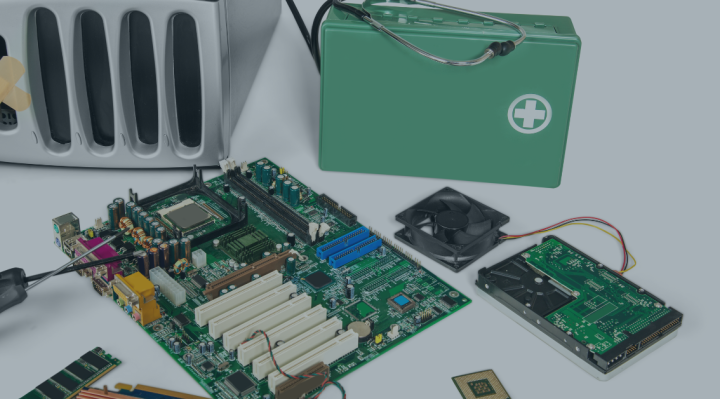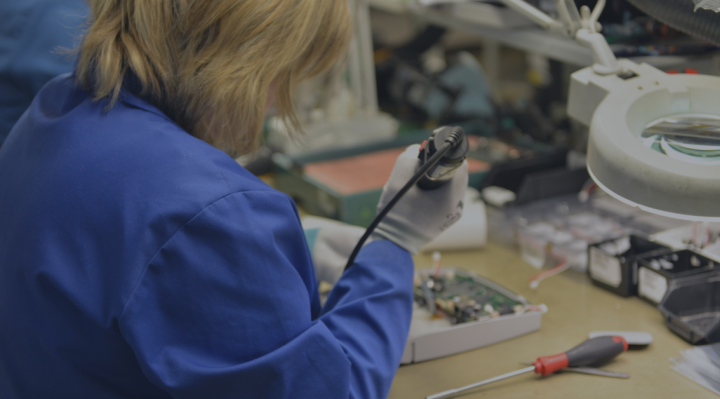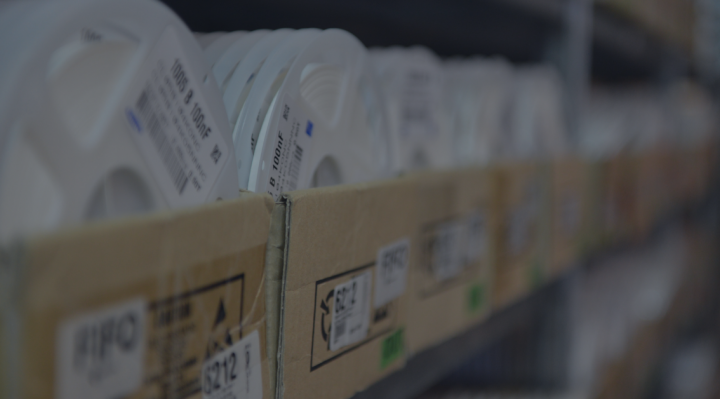Supply chain management is not only limited to purchasing materials, but it also includes other elements, such as effective demand planning, quick reacting to changes in demand, audits of suppliers, inspections of provided materials, management of stock levels and excessive materials, observance of the applicable law, taking care of environmental, and reacting to crisis situations, for example, epidemics, conflicts or natural disasters.
It is a complicated process including many varied elements. It has a direct influence on the timely realisation of projects and their costs, especially, that the price of materials used for production usually constitutes a major part of a final product.
Thus, it proves the importance of the optimised organisation of a stable supply chain, which is possible thanks to extensive experience of EMS providers in the area of change and risk management within the supply chain and their use of advanced planning ERP systems adjusted to the specificity of contract manufacturing.
Selection of EMS suppliers
The decision regarding the choice of an EMS contract provider is strictly related to selecting a supply chain management model. A company ordering assembly can supply the EMS provider with materials itself (customer-provided material) or use an EMS provider’s supply chain.
The first option requires OEMs to organise a supply chain themselves, take care of quality, quantity, packaging and timeliness of deliveries, inspect provided materials as well as store them properly. This approach is not only difficult and time-consuming, but also it generates costs and involves employment of some specialists and investments in advanced ERP systems, which are extremely expensive.
Therefore, it is better to share the costs of maintaining the team of specialists and IT solutions with other OEM providers and delegate this task to a contract EMS provider who, due to a huge number of orders, has good and long-established relations with suppliers, and verifies them regularly. Moreover, EMS providers regularly conduct audits regarding the quality and prices of materials as well as technological opportunities and solutions applied by various suppliers. The most important, however, is the fact that they take care of timely deliveries and the lowest possible prices of material.
Assessment of suppliers and inspection of provided material
At Assel we pay special attention to our relations with suppliers as well as audits that we conduct. Although each of our suppliers is thoroughly verified, we still check every package and in case of any inconsistences, we sent NCR reports to the supplier, and expect 8D reports. Corrections that are implemented by suppliers on the basis of the 8D reports as well as timely deliveries and supplies of materials constitute basic factors in the assessment process of a supplier. We take all these measures in order to select the best suppliers and provide the highest quality of materials, final products and our production process.
Supply chain management
Every supply chain consists of manufacturers, suppliers, distributors and customers. Its management involves planning, realisation, supervision and monitoring of activities performed by all the parties engaged in the process as well as adjusting to constant changes resulting from, for example, varying OEMs’ demand.
A well-managed supply chain enables taking proper care of high quality of materials, timely deliveries, low stock levels as well as effective reacting to changes and crisis situations, and providing the shipment of final products according to a schedule. In fact, these activities guarantee success of projects carried out by an EMS provider.
A huge support in the completion of this complicated process are ERP (Enterprise Resource Planning) systems used to manage business information, integrate systems, optimise procedures and improve efficiency. The ERP systems enable planning and monitoring of various aspects of the supply chain, such as flow of materials and information, and dealing with financial issues. These systems greatly facilitate, as well, the management of all activities included in the process starting with purchase planning and signing agreements with providers, and ending with the shipment of products to end customers.
Intelligent management of the EMS supply chain
At Assel we use an integrated ERP system (Microsoft Dynamics AX) including a feature of active material planning – MRP2 – adjusted to the needs of contract EMS providers. Moreover, we apply MES (Manufacturing Execution System) which allows us to track and manage materials as well as monitor our production process.
The integration of the ERP system with the MES system gives us an access to feedback and allows to include all material requirements. An MRP2 loop, which is launched every day, provides us with an opportunity to react quickly to any changes in the OEMs’ demand. As a result, we are able to minimise the amount of excessive material that is not used and, consequently, reduce the financial responsibility of our customers.
What is more, we apply a propriety SSC solution used for intelligent management of the supply chain. This really powerful tool enables us to constantly monitor the supply chain, react to changes and problems sufficiently in advance, quickly implement corrections in our orders from suppliers (cancellation of an order, acceleration and delaying of delivery), and take proper preventive actions.
Improvement of the supply chain
Key parameters of the supply chain are: a price of material, delivery time, stability and flexibility of deliveries. The main goal is to provide lower prices, shorten delivery time as well as increase stability and flexibility. These are not, however, the only elements responsible for the optimisation of the EMS provider’s supply chain.
Incredibly important aspects are also the management of excess material and changing OEMs’ demand as well as individual manufacturing capabilities (availability of machines and employees). These are influenced not only by capabilities and efforts of the EMS provider, but also proper communication with customers who, in their own interest, should clearly define deadlines for completion of projects and their demand because these factors greatly facilitate the cooperation with material providers.
A good practice applied by contract providers is also the constant monitoring of inventory and orders control procedures. This activity enables them to acquire information regarding all stages of the supply chain. Some of EMS providers use for this operation some advanced statistical methods which allow them not only to improve their products, but also to find some trends and predict any deviations in demand.
Next aspect ensuring the stability of the supply chain is finding some alternative suppliers who will ensure the maintenance of production in units located in different parts of the world. Such an undertaking guarantees uninterrupted supplies to a customer in case of a crisis situation in one of the regions. Moreover, it is necessary to monitor suppliers regarding their financial stability, changes in ownership and business strategies because they can have an influence on their deliveries.
Legal provisions and social responsibility
Incredibly important elements of proper supply chain management are observance of the applicable law and the implementation of ethical principles.
A responsible EMS provider keeps up-to-date with legal provisions and operates with the use of procedures enabling them to take proper actions. Moreover, before placing an order from suppliers, they check the BOM of an OEM to make sure that all parts are compliant with the newest regulations.
Manufacturing of electronic equipment in the European Union is a subject to two key directives: RoHS restricting the use of hazardous substances and REACH defining a legal obligation to register, evaluate, authorise and reduce the use of chemicals. These directives are aimed at preventing the improper use of chemicals. Their requirements must be implemented by EMS providers who are also obliged to obey a WEEE directive when it comes to used electrical equipment. The WEE directive sets out the rules for the collection and recycling of electrical equipment. and imposes on the EMS providers the necessity to conduct supply chain controls in order to verify if there are any undesirable materials included, for example, zinc, tantalum, wolfram and gold originating from some conflict zones.
Other key element is the optimisation of waste resulting from the implementation of a Lean approach and the reduction of energy consumption, which is possible thanks to an automized managing of systems in a building.
Moreover, when contract providers selects suppliers, they should pay special attention to ethical issues related to proper remuneration of employees as well as non-application of slave and child labour.
Assel carefully obeys all the legal provisions and rules set in an internal policy defining ethical conduct, anti-corruption policy and CSR (Corporate Social Responsibility) strategy compliant with ISO 26000 requirements.
Creation, maintenance and optimisation of a stable, flexible and compliant with the law supply chain is a difficult task requiring engagement of many sources, skills and experience in many areas.
Therefore, it is reasonable to delegate full control over the supply chain to the contract EMS provider as it allows not only to guarantee timely deliveries of high quality materials, but also avoid general costs resulting from deliveries, their servicing and storing. The most important benefit, however, is that OEMs can devote their time to designing, marketing activities and sales of products.
Read more about Supply Chain Solutions at Assel.






